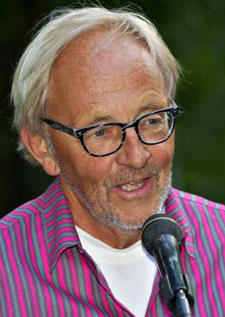Nato and Russia – a tragedy unfolding
By Gunnar Westberg
In the antique Greek tragedy the end is often predetermined by the initial conditions. The King may have committed an unforgiveable transgression and the consequences are born by him and his House.
Step follows upon step, each step decided by Fate, and the characters have little choice, given their nature and their perception of the situation. In the end Fate brings destruction upon the King and his House.
Prologue
In 1984 a group from IPPNW Sweden met with the Norwegian general Tönne Huitfeldt, at that time Chief of the Military Staff of Nato. He was a man with great confidence in himself and in the military system.
“General Huitfeldt”, we asked, “when you work with your war scenarios in the Nato Headquarters, with the destruction of the world through a nuclear war looming as a possible outcome, are you not scared?”. “Oh no, never,” he responded. “The Russians are as rational as we are. They will never let it go too far. I am never scared”.
Well, we were. And are. In 1984 the general was unaware that in 1983 we had on two occasions come very close to a nuclear world war, first in the “Petrov incident” and second as a development of the Russian misunderstanding of Nato’s “Able Archer” exercise.
We also asked: What happens if Peace breaks out? What would happen to Nato if the Soviet Union fell and the Warsaw pact was terminated? Nato would remain, he assured us. Nato is an organisation of great resilience and will search and find its purpose, even if the original purpose is gone.
We did not understand. We did not believe. But here General Huitfeldt was right: Nato forever!
Act I.
In 1991 the Soviet Union falls apart and the Warsaw Pact is terminated. Peace in our time!
Nato has lost its raison d’être but remains intact, and keeps looking for a new purpose. Already in 1997 Poland, Czech Republic and Hungary were invited to join the alliance. This broke the promise given to the Russian leaders that no former Warsaw pact states would become Nato members. But how could Nato say No to countries who had suffered so much from the repression of Soviet Union? They demanded protection and saw no alternative to Nato. Partnership for Peace and the OSCE, the Organisation for Security and Cooperation in Europe, should have been developed into credible alliances for mutual security. That was never attempted. But Nato welcomed the states in Eastern Europe and grew from 16 to 28 members.
In most Greek tragedies there is a Cassandra, a prophet, who sees the coming disaster but is ignored or ridiculed. Here it was George Kennan, who had a deep understanding of how Russia saw itself and its relations to Europe and the USA. ”I think the Nato expansion is the beginning of a new cold war. The Russians will gradually react quite adversely and this will affect their policies. I think it is a tragic mistake.”
Act II.
Nato has now expanded up to the borders of Russia. The West encourages “revolutions” in different colours in several of Russia’s neighbouring countries. Mr Putin, who is afraid of these democratic movements, uses the perceived threats against Russia to strengthen his position, easily done in a Russia, which is almost as humiliated and revengeful as Germany was after the Versailles accord. President Saakashwili of Georgia is encouraged to enter into a war concerning Ossetia and Abkhazia but is quickly stopped by the now recuperating Russian forces.
Putin is worried. Then Ukraine and Georgia get preliminary invitations to join EU and Nato. Putin sees his chance to gain support at home and takes over Crimea – a move expected by most observers except Nato officials – and supports a Russian separatist movement in Ukraine.
Act III. (In the near future)
With time, a cease-fire is agreed, an armistice line decided, but the conflict simmers for years. Whenever the Russian leader needs to stoke the nationalistic fire in Russia the situation in Ukraine provides excellent fuel.
However, in the USA and its allies, there is discontent. The King’s control of the world is questioned. “Do not try to negotiate with the Russian bear, he understands only the whip!” Finland and Sweden are persuaded by both US flattery and, more, by Putin’s demagogy, to become Nato members. Ukraine and Georgia join, maybe in a moment when Russia is busy elsewhere. Tension increases, and a growing opposition in an increasingly impoverished Russia causes Mr Putin to look for a useful international conflict. There is always Ukraine, and the Russian minorities in countries that were once members of the Soviet Union. Russia mobilizes and postures.
Act IV. Here the Tragedian wishes to lay down his quill. He is a narrator, not a prophet.
The unforgivable transgression committed by the King is his Hubris, his belief that he rules the world, regardless of the laws of men or Gods. In a Greek tragedy the King and his people will suffer the consequences of this original sin, the hubris, and be destroyed.
But the King has in his quiver something the Greeks could never have imagined, the weapons that can destroy the world before the Gods do.
Will the King’s hubris, his extreme pride and self-confidence, remain with him to the end, and cause The End?
Sometimes the Gods show clemency with the mortals. Will they remove the King’s madness? Or will the mortals bring our destruction, the Armageddon?
The nuclear weapons rest in their silos and in depth of the oceans, waiting for the final order.
